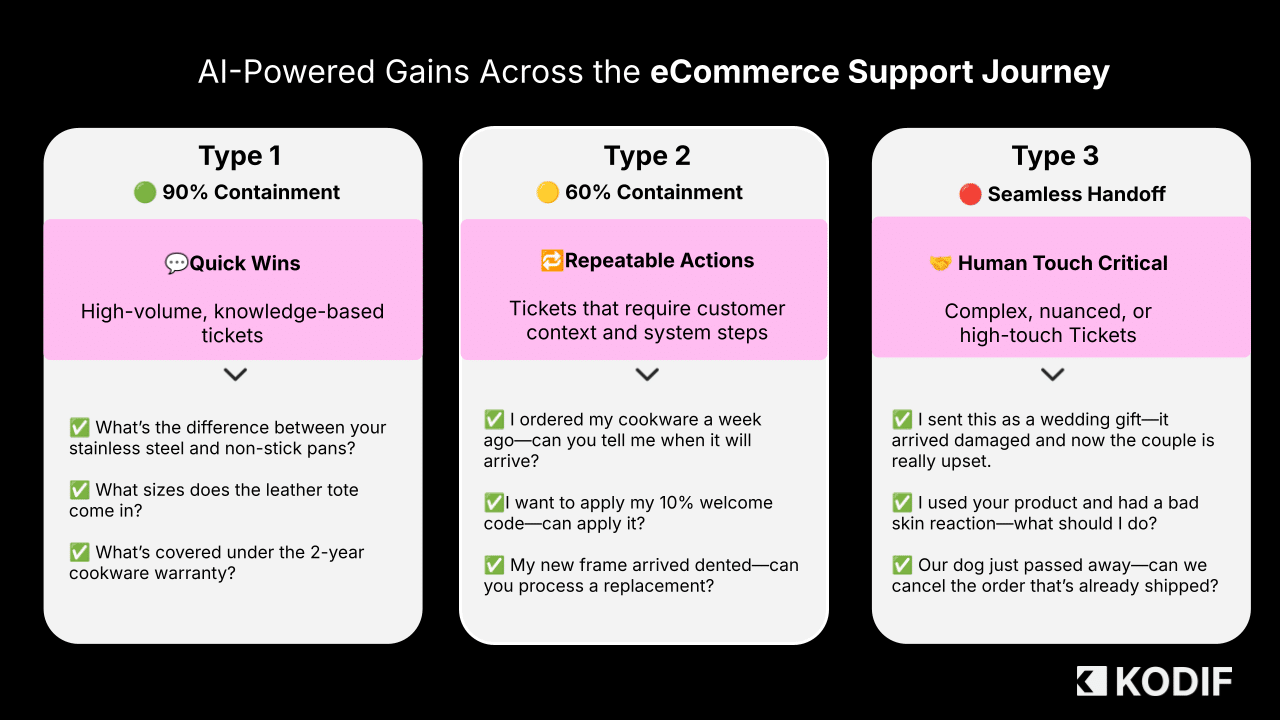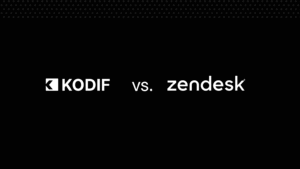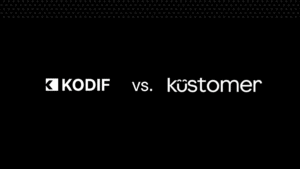The business process outsourcing (BPO) industry is facing one of the most disruptive shifts in its history.
The driver isn’t just AI, it’s the changing expectations of the companies BPOs serve.
Support leaders are under pressure to deliver more with less. They’re being asked to operate leaner, deliver across more channels, automate routine requests, and provide data-backed insights, not just headcount.
At the same time, the volume of support conversations is exploding: the average ecommerce brand handles over 10,000+ tickets per month, with 60–80% of those falling into repeatable, automatable categories.
Meanwhile, AI is reshaping the definition of what “support” looks like.
- GenAI is now resolving Tier 1 and Tier 2 tickets across chat, email, and social channels at resolution rates of 70–90%, depending on the workflow.
- CX labor is shifting: $300B globally is moving from purely human support to AI-augmented service models.
- AI-enabled teams are cutting response times from days to minutes and achieving 9x faster resolution compared to legacy workflows.
- New CX-focused AI companies (Sierra, Decagon, Crescendo, et al.) have raised over $1B in funding to challenge traditional support models with AI-native services.
The BPO model built around staffing and cost-efficiency is becoming outdated. Leading brands are no longer just outsourcing to reduce costs. They’re looking for expertise, insight, and integrated technology that can flex with their business needs.
The shift isn’t hypothetical. It’s already happening.
In fact, we’re watching the same pattern play out that transformed IT operations two decades ago. Then, companies struggled to manage increasingly complex infrastructure—backups, redundancy, compliance, and turned to managed service providers (MSPs) to take on that complexity at scale.
Now, CX is at the same inflection point.
Just like MSPs reshaped IT, a new kind of partner is needed to handle modern CX. One that doesn’t just provide labor, but delivers technology, process leadership, AI capability, and proactive insights. One that helps clients move from firefighting to forward planning.
BPOs in the AI Future
Outsourcing organizations already have strong systems in place to hire excellent talent to face both front-line and backline support with high empathy and knowledge.
Even if AI can handle the easiest of tickets, the role of support agents will not disappear, but will be elevated instead.
“AI empowers both the customer and the CX team. Technology, when paired with human empathy, elevates the entire customer experience, ultimately driving a brand’s revenue and growth.” – Greg Collins, CRO of Boldr.
We believe that this shift presents a powerful opportunity for BPOs to evolve from traditional service providers into Managed Customer Experience Providers (MCXP).
The future of the outsourcing market is not “BPOs vs AI”, it will be “AI-enabled BPOs vs other BPOs”.
Companies need diverse support options, such as proactive in-product support, automated actions for self-service, and omnichannel capabilities.
It is here that BPOs can play an impactful role, offering not just labor but CX expertise, providing the technology, infrastructure, oversight, and management needed to execute a top-tier customer experience strategy for their clients.
As an MCXP, BPOs would enable businesses to bypass costly investments, search processes, contract negotiations, etc., for CX technology and specialized talent.
They would offer services such as conversational AI design, technology procurement, and ongoing system management, all at scale and for a more cost-effective rate than clients could achieve on their own.
With an MCXP model, BPOs become holistic partners in customer experience, delivering both the people and the robust technology infrastructure needed for end-to-end support.
Horatio exemplifies this approach by combining AI technology, skilled human teams, and strategic CX consulting to deliver end-to-end managed experience for global ecommerce and retail brands.
“The future of BPO isn’t about replacing humans with AI. It’s about combining the best of both to elevate the customer experience. That’s the transformation we’re leading at Horatio.” – Jose Herrera, CEO & Co-Founder of Horatio
Why managed CX?
Customer support is much more than just answering questions. In most cases, your support agents are the primary face of the company in post-sale interactions with customers.
Customers judge the quality of service not only by how easily they can access information, how quickly their problems are resolved, or the tone of the person on the other end of a call—they judge how they feel during all of these interactions and every other touchpoint they experience.
It’s well-documented that customer experience is a key differentiator among companies and their competitors.
But to be the top provider of that differentiator, you need specialized skills and leaders who understand not just the customers they’re serving, but also the technology available to deliver those services effectively.
BPOs can deliver these services more cost-effectively and at a greater scale than many of their clients can manage internally.
By offering managed customer experience services, outsourcers can generate revenue by tackling complex customer service challenges and maintaining teams whose sole focus is staying ahead of evolving industries, market trends, and shifting customer expectations.
This may include ownership of voice-of-customer programs, increased engagement with social media, access to industry benchmarks, and, most importantly, a robust set of technological tools to solve the business problems at hand.
Many of your clients are likely asking questions such as:
- How can we make our help desk more efficient?
- What AI technologies should we be using?
- What are the best practices for launching or modifying communication channels?
- How can we increase self-service or improve our knowledge management strategy?
These questions often go unanswered, beyond hiring different skill sets or new leaders, and even then, those individuals may not have the capacity to keep up with the pace of the market and evolving customer demands.
BPOs, by working across multiple industries and with a wide variety of tools and customer demographics, have unique access and insight.
This diversification should be treated as an asset—one that enables you to define and sell new roles, and expand the range of services you offer.
For instance, Horatio leverages its deep industry knowledge across ecommerce, fashion, health, and fintech to proactively surface customer trends and inform client strategies, and thanks to KODIF, turns insights into competitive advantage.
How does KODIF fit in?
KODIF’s platform increases productivity across each type of ticket your team encounters, as well as provides the insights and oversight required to stay on top of customer demands.
Through a series of features targeted at every level of your support organization, we decreased the time needed to resolve tickets to operate at peak efficiency.
KODIF is the underpinning technology to help you transform your business from BPO to AI-enabled BPO to Managed CX Provider.

The goal of KODIF’s partnership program is to enable improvements to your already top-quality support services by creating more personalized customer experiences and facilitating deeper, more consultative human interactions.
Horatio, for example, is already live with KODIF’s AI chat solution on their website, actively demonstrating the potential of AI-augmented CX.
In parallel, our offerings will help you go to market with new revenue streams added to your services lists that can offer expansion opportunities for existing clients, more options for prospects, and overall increase your margins.
Continuous evolution
As the CX landscape continues to evolve, strategic technology partnerships will be essential to delivering value to your clients.
By aligning with one or more leading-edge technology providers, BPOs can ensure they are offering clients the best possible solutions while keeping pace with the market’s rapid advancements.
In this new model, BPOs don’t merely respond to support requests—they become essential, value-adding partners in their clients’ CX journey and drive holistic business changes based on the data and trends they capture.









